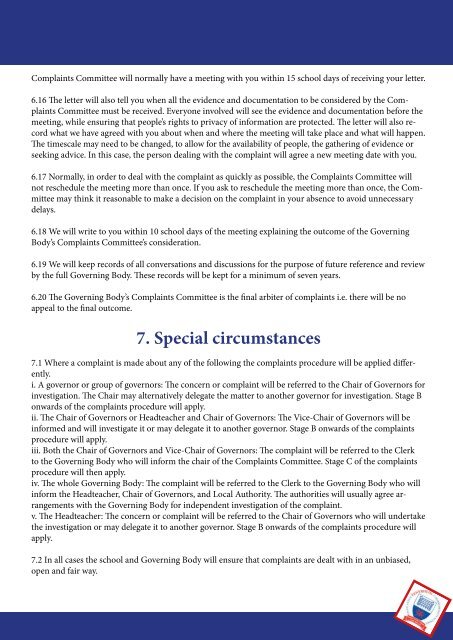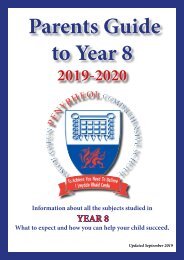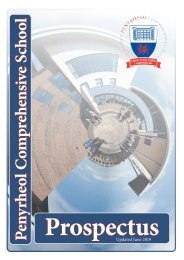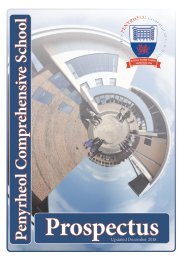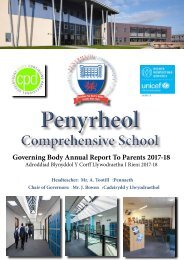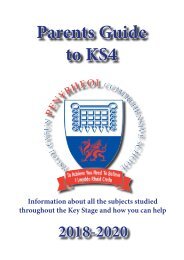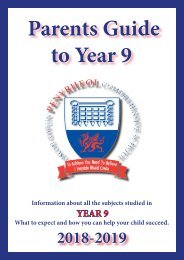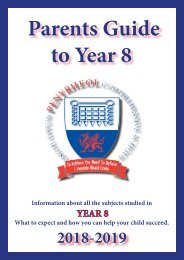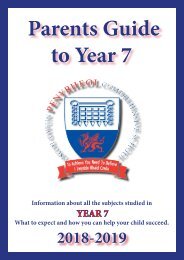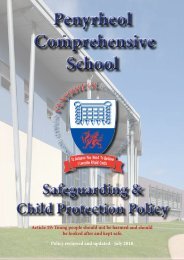Complaints Policy Updated September 2018
Create successful ePaper yourself
Turn your PDF publications into a flip-book with our unique Google optimized e-Paper software.
<strong>Complaints</strong> Committee will normally have a meeting with you within 15 school days of receiving your letter.<br />
6.16 The letter will also tell you when all the evidence and documentation to be considered by the <strong>Complaints</strong><br />
Committee must be received. Everyone involved will see the evidence and documentation before the<br />
meeting, while ensuring that people’s rights to privacy of information are protected. The letter will also record<br />
what we have agreed with you about when and where the meeting will take place and what will happen.<br />
The timescale may need to be changed, to allow for the availability of people, the gathering of evidence or<br />
seeking advice. In this case, the person dealing with the complaint will agree a new meeting date with you.<br />
6.17 Normally, in order to deal with the complaint as quickly as possible, the <strong>Complaints</strong> Committee will<br />
not reschedule the meeting more than once. If you ask to reschedule the meeting more than once, the Committee<br />
may think it reasonable to make a decision on the complaint in your absence to avoid unnecessary<br />
delays.<br />
6.18 We will write to you within 10 school days of the meeting explaining the outcome of the Governing<br />
Body’s <strong>Complaints</strong> Committee’s consideration.<br />
6.19 We will keep records of all conversations and discussions for the purpose of future reference and review<br />
by the full Governing Body. These records will be kept for a minimum of seven years.<br />
6.20 The Governing Body’s <strong>Complaints</strong> Committee is the final arbiter of complaints i.e. there will be no<br />
appeal to the final outcome.<br />
7. Special circumstances<br />
7.1 Where a complaint is made about any of the following the complaints procedure will be applied differently.<br />
i. A governor or group of governors: The concern or complaint will be referred to the Chair of Governors for<br />
investigation. The Chair may alternatively delegate the matter to another governor for investigation. Stage B<br />
onwards of the complaints procedure will apply.<br />
ii. The Chair of Governors or Headteacher and Chair of Governors: The Vice-Chair of Governors will be<br />
informed and will investigate it or may delegate it to another governor. Stage B onwards of the complaints<br />
procedure will apply.<br />
iii. Both the Chair of Governors and Vice-Chair of Governors: The complaint will be referred to the Clerk<br />
to the Governing Body who will inform the chair of the <strong>Complaints</strong> Committee. Stage C of the complaints<br />
procedure will then apply.<br />
iv. The whole Governing Body: The complaint will be referred to the Clerk to the Governing Body who will<br />
inform the Headteacher, Chair of Governors, and Local Authority. The authorities will usually agree arrangements<br />
with the Governing Body for independent investigation of the complaint.<br />
v. The Headteacher: The concern or complaint will be referred to the Chair of Governors who will undertake<br />
the investigation or may delegate it to another governor. Stage B onwards of the complaints procedure will<br />
apply.<br />
7.2 In all cases the school and Governing Body will ensure that complaints are dealt with in an unbiased,<br />
open and fair way.


